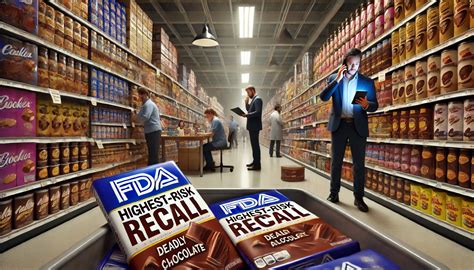
A nationwide chocolate recall has been issued due to the potential presence of undeclared peanuts and tree nuts, posing a severe, potentially life-threatening allergic reaction risk to consumers.
Nationwide Chocolate Recall Triggered by Allergy Concerns
A major chocolate manufacturer, Palmer Candy Company, has initiated a nationwide recall of numerous chocolate products due to the potential presence of undeclared peanuts and tree nuts, according to an announcement made by the U.S. Food and Drug Administration (FDA). This recall, initiated on May 3, 2024, raises significant concerns for individuals with peanut and tree nut allergies, as consumption of the affected products could trigger severe or life-threatening allergic reactions.
The recall encompasses a wide range of Palmer Candy products, distributed across the United States through various retail outlets. The FDA’s notice emphasizes the importance of immediate consumer action: individuals with known peanut or tree nut allergies should immediately cease consumption of any Palmer Candy products and inspect their purchased chocolate items for the specific products listed in the recall notice.
The root cause of the recall stems from a cross-contamination issue at Palmer Candy’s manufacturing facility. While specific details regarding the contamination event remain under investigation, preliminary findings suggest that peanuts and tree nuts may have inadvertently entered the production line, leading to their potential presence in products that were not intended to contain these allergens.
According to the FDA’s announcement, “People who have an allergy or severe sensitivity to peanuts and tree nuts run the risk of serious or life-threatening allergic reaction if they consume these products.” This stark warning underscores the gravity of the situation and the potential health risks involved.
The Palmer Candy Company is actively working with the FDA to identify the precise extent of the contamination and implement corrective measures to prevent future incidents. These measures are expected to include enhanced cleaning and sanitation protocols, stricter allergen control procedures, and more rigorous testing of raw materials and finished products.
Consumers who have purchased any of the recalled products are urged to return them to the place of purchase for a full refund. Alternatively, consumers can contact Palmer Candy Company directly for instructions on how to dispose of the affected products safely. Palmer Candy has also established a dedicated consumer hotline to address any questions or concerns related to the recall.
The FDA is closely monitoring the recall and will continue to provide updates to the public as more information becomes available. The agency is also working with Palmer Candy to ensure that the recall is conducted effectively and that all affected products are removed from the market as quickly as possible.
This recall serves as a crucial reminder of the importance of accurate labeling and allergen control in the food manufacturing industry. Food allergies are a significant public health concern, affecting millions of Americans, and any failure to properly manage allergens can have serious consequences. The FDA is committed to working with food manufacturers to ensure that they are meeting their obligations to protect consumers with food allergies.
Affected Products and Identification
The extensive list of recalled products includes a variety of chocolate candies, highlighting the potential for widespread consumer exposure. The affected products are typically sold in retail stores, supermarkets, and online. Here’s a breakdown of some of the products involved:
-
Caramel Swirls: These candies, known for their creamy caramel filling encased in chocolate, are included in the recall due to the potential for peanut and tree nut contamination.
-
Double Crisp Peanut Butter filled Egg: These chocolate eggs are being recalled as the label does not declare peanut ingredients, posing a threat to people with peanut allergies.
-
Fudge Eggs: A wide variety of fudge eggs are being recalled.
-
Peanut Butter Cups: While inherently containing peanuts, some batches may have been mislabeled or contaminated.
-
Pretzels with Chocolate Coating: These popular snacks, combining the saltiness of pretzels with the sweetness of chocolate, are also subject to the recall.
-
Smothered Animal Crackers: The coating of chocolate on these animal crackers poses a threat.
-
Various Holiday-Themed Chocolates: Chocolates marketed for specific holidays, such as Easter, Christmas, and Valentine’s Day, are among the recalled items.
Consumers are advised to carefully examine the packaging of any Palmer Candy products they have purchased, paying close attention to the ingredient list and any allergen warnings. The recall notice provides detailed information on the specific products affected, including product names, sizes, and UPC codes. If a product is identified as part of the recall, it should not be consumed.
Understanding Food Allergies and Allergic Reactions
Food allergies occur when the body’s immune system mistakenly identifies a food protein as harmful. This triggers an immune response that can cause a range of symptoms, from mild skin rashes and digestive upset to severe and potentially life-threatening reactions known as anaphylaxis.
Anaphylaxis is a severe allergic reaction that can occur rapidly and affect multiple body systems. Symptoms of anaphylaxis can include:
- Difficulty breathing or wheezing
- Swelling of the tongue, lips, or throat
- Hives or a widespread rash
- Dizziness or loss of consciousness
- Vomiting or diarrhea
- A sudden drop in blood pressure
Anaphylaxis is a medical emergency that requires immediate treatment. Individuals experiencing symptoms of anaphylaxis should seek emergency medical attention immediately. The standard treatment for anaphylaxis is an injection of epinephrine (adrenaline), which can help to reverse the symptoms and stabilize the patient.
The most common food allergens include peanuts, tree nuts, milk, eggs, soy, wheat, fish, and shellfish. However, virtually any food can trigger an allergic reaction in susceptible individuals.
The Role of the FDA in Food Safety
The FDA plays a critical role in ensuring the safety of the food supply in the United States. The agency is responsible for regulating the production, labeling, and distribution of food products, including chocolate. The FDA also investigates foodborne illnesses and outbreaks, and it has the authority to issue recalls of unsafe food products.
The FDA’s food safety regulations are designed to protect consumers from a variety of hazards, including food allergies. The agency requires food manufacturers to label their products accurately and to identify any potential allergens that may be present. The FDA also conducts inspections of food manufacturing facilities to ensure that they are following proper food safety practices.
In the event of a food recall, the FDA works closely with the manufacturer to ensure that the affected products are removed from the market as quickly as possible. The FDA also issues public warnings to alert consumers about the recall and to provide information on how to return or dispose of the affected products.
Previous Food Recalls and Lessons Learned
Food recalls are not uncommon, and they can occur for a variety of reasons, including contamination with bacteria, viruses, or allergens; mislabeling; or the presence of foreign objects. In recent years, there have been several high-profile food recalls that have raised concerns about the safety of the food supply.
One notable example is the 2018 recall of romaine lettuce due to contamination with E. coli bacteria. This outbreak sickened hundreds of people across the United States and Canada, and it led to several deaths. The outbreak was linked to contaminated irrigation water used to grow the lettuce.
Another recent recall involved peanut butter products contaminated with Salmonella bacteria. This outbreak sickened hundreds of people and led to a massive recall of peanut butter and peanut-containing products.
These and other food recalls have highlighted the importance of strong food safety regulations and the need for food manufacturers to implement rigorous food safety practices. They have also underscored the importance of consumer awareness and the need for individuals to be vigilant about checking food labels and heeding recall warnings.
Preventing Allergic Reactions: A Proactive Approach
For individuals with food allergies, preventing allergic reactions requires a proactive and multi-faceted approach. This includes:
-
Careful Label Reading: Always read food labels carefully before consuming any product. Pay close attention to the ingredient list and any allergen warnings.
-
Avoiding Cross-Contamination: Be aware of the potential for cross-contamination in food preparation areas. Use separate cutting boards, utensils, and cookware for allergen-free foods. Wash your hands thoroughly after handling any food that contains allergens.
-
Communicating with Restaurants and Food Manufacturers: When eating out, inform the restaurant staff about your food allergies and ask about the ingredients and preparation methods used in the dishes you are considering. Contact food manufacturers directly if you have any questions or concerns about their products.
-
Carrying Epinephrine Auto-Injectors: If you have a history of severe allergic reactions, carry epinephrine auto-injectors (such as EpiPen or Auvi-Q) with you at all times. Make sure you know how to use the auto-injectors and that your family members and close friends are also trained.
-
Wearing Medical Identification: Consider wearing a medical identification bracelet or necklace that identifies your food allergies. This can be helpful in an emergency situation if you are unable to communicate.
-
Working with an Allergist: Consult with an allergist to develop a comprehensive allergy management plan. This may include allergy testing, education on allergen avoidance, and instructions on how to manage allergic reactions.
The Impact on Palmer Candy Company and the Chocolate Industry
The nationwide recall is likely to have a significant impact on Palmer Candy Company, both financially and reputationally. The company will incur substantial costs associated with the recall, including the cost of removing affected products from the market, refunding consumers, and investigating the cause of the contamination. The recall may also damage the company’s reputation and lead to a loss of consumer trust.
The recall could also have broader implications for the chocolate industry as a whole. It may prompt other chocolate manufacturers to review their allergen control procedures and to take steps to prevent similar incidents from occurring. The recall could also increase consumer awareness of food allergies and lead to greater scrutiny of food labels and manufacturing practices.
Consumer Resources and Information
Consumers who have questions or concerns about the Palmer Candy recall can contact the company directly or consult the following resources:
-
Palmer Candy Company: Contact information can be found on the company’s website or in the recall notice issued by the FDA.
-
U.S. Food and Drug Administration (FDA): The FDA’s website (www.fda.gov) provides information on food recalls, food allergies, and food safety regulations.
-
Food Allergy Research & Education (FARE): FARE is a non-profit organization that provides resources and support to individuals with food allergies and their families. Their website (www.foodallergy.org) offers information on allergen avoidance, managing allergic reactions, and advocacy for food allergy research and awareness.
-
American Academy of Allergy, Asthma & Immunology (AAAAI): AAAAI is a professional organization of allergists and immunologists. Their website (www.aaaai.org) provides information on food allergies, asthma, and other allergic diseases.
Long-Term Solutions and Preventive Measures
To prevent future food recalls related to allergens, the food industry needs to focus on implementing long-term solutions and preventive measures. These include:
-
Strengthening Allergen Control Programs: Food manufacturers should develop and implement comprehensive allergen control programs that address all aspects of the production process, from raw material sourcing to finished product labeling.
-
Enhancing Cleaning and Sanitation Protocols: Thorough cleaning and sanitation protocols are essential to prevent cross-contamination. Manufacturers should use validated cleaning procedures and regularly monitor their effectiveness.
-
Investing in Employee Training: Employees should be properly trained on allergen awareness, food safety procedures, and the importance of preventing cross-contamination.
-
Improving Labeling Accuracy: Food labels must be accurate and clearly identify all potential allergens. Manufacturers should use clear and concise language and follow FDA labeling regulations.
-
Adopting Advanced Detection Technologies: Advanced detection technologies, such as allergen-specific ELISA tests, can be used to detect the presence of allergens in raw materials and finished products.
-
Promoting Collaboration and Information Sharing: Collaboration between food manufacturers, regulatory agencies, and consumer groups is essential to improve food safety and prevent food recalls.
Conclusion
The nationwide chocolate recall triggered by the potential presence of undeclared peanuts and tree nuts underscores the critical importance of allergen control in the food industry. Consumers with food allergies must remain vigilant about reading food labels and taking precautions to avoid cross-contamination. Food manufacturers must prioritize food safety and implement robust allergen control programs to protect consumers from potentially life-threatening allergic reactions. The FDA plays a crucial role in regulating the food industry and ensuring the safety of the food supply. By working together, food manufacturers, regulatory agencies, and consumers can help to prevent future food recalls and protect public health. This incident serves as a stark reminder that even seemingly minor lapses in food safety protocols can have significant and potentially devastating consequences for individuals with food allergies. The long-term impact of this recall will likely include increased scrutiny of food manufacturing practices, enhanced allergen control measures, and a renewed focus on consumer education and awareness. As the investigation into the root cause of the contamination continues, it is imperative that all stakeholders work collaboratively to identify and address any systemic issues that may have contributed to this incident. Only through a comprehensive and coordinated effort can we ensure the safety and integrity of the food supply and protect the health of vulnerable individuals with food allergies.
Frequently Asked Questions (FAQ)
-
What chocolate products are being recalled?
The Palmer Candy Company is recalling a wide range of chocolate products due to the potential presence of undeclared peanuts and tree nuts. Specific products include, but are not limited to, Caramel Swirls, Fudge Eggs, Peanut Butter Cups, Pretzels with Chocolate Coating, and various holiday-themed chocolates. Consumers should refer to the FDA’s recall notice for a complete list of affected products and their corresponding UPC codes.
-
Why are these chocolate products being recalled?
The recall is due to a potential cross-contamination issue at Palmer Candy Company’s manufacturing facility, where peanuts and tree nuts may have inadvertently entered the production line. This poses a serious risk to individuals with peanut and tree nut allergies, as the products may not be properly labeled to indicate the presence of these allergens.
-
What should I do if I have purchased one of the recalled chocolate products?
If you have purchased any of the recalled chocolate products and have a peanut or tree nut allergy, you should immediately discontinue consumption of the product. Return the product to the place of purchase for a full refund. You can also contact Palmer Candy Company directly for instructions on how to safely dispose of the affected product. Do not consume the product, even if you have not experienced any allergic symptoms, to avoid any potential health risks.
-
What are the symptoms of an allergic reaction to peanuts or tree nuts?
Symptoms of an allergic reaction to peanuts or tree nuts can range from mild to severe and may include: skin rashes, hives, itching, swelling of the lips, tongue, or throat, difficulty breathing, wheezing, nausea, vomiting, diarrhea, abdominal pain, dizziness, lightheadedness, and loss of consciousness. In severe cases, anaphylaxis, a life-threatening allergic reaction, can occur. Anaphylaxis requires immediate medical attention and treatment with epinephrine (adrenaline).
-
How can I prevent allergic reactions to food?
To prevent allergic reactions to food, it is essential to read food labels carefully and avoid products that contain known allergens. When eating out, inform restaurant staff about your food allergies and inquire about the ingredients and preparation methods used in the dishes you are considering. Be aware of the potential for cross-contamination in food preparation areas. If you have a history of severe allergic reactions, carry epinephrine auto-injectors with you at all times and wear a medical identification bracelet or necklace that identifies your food allergies. Consult with an allergist to develop a comprehensive allergy management plan.









